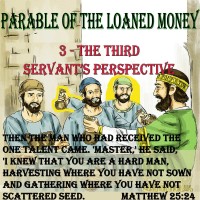

Read: Matthew 25:14-27 |
Two fellows decided to go into the produce business. They got into their pickup truck and drove 100 miles into the country. They found a farmer willing to sell them watermelons for half of a dollar each. They loaded up and drove back to town. In town, they sold them two for a dollar.
At the end of the day, they figured out that they had just as much money as when they had started. One hollered, “I told you we wouldn’t make a profit unless we got a bigger truck!”
Possibly some of their hole-riddled logic ran through the third servant’s mind as he was trying to figure out what to do with the talent he had been given. As you recall, the third servant had been granted one talent based on the “ability” that his Master saw in him. This servant had the same choices as the other servants. He could live up to the faith of his Master and put the talent to work. Alternatively, he could yield to the temptation of disobedience and do nothing with it. Obviously, we know that he chose the latter. However, what can we learn from him to avoid falling for the same trick?
Trust –> Test –> Temporary Assignment
Rick Warren, author of “Purpose Driven Life”, points out that we each start our Christian journey with a “Trust”, then a “Test”. We then continue with our “Temporary assignment” on earth until we go to heaven for eternity.
The trust is the gifts we’ve been given, which are both spiritual gifts and natural gifts. The tests are God allowed tests and trials. We grow by resisting temptation, for we are never tempted beyond what we can endure. [I Cor. 10:13] As we prove ourselves faithful, God blesses us and grooms us for more responsibility.
In the parable, each servant was entrusted with talents. Their test was to do the Master’s bidding while he was away. Their temporary assignment was to act on the Master’s will. In the case of the first two servants, they successfully applied themselves to each step. The third servant however, had the same test, the same trust but failed on his temporary assignment.
3rd Servants Motive
The motives of the 3rd servant were twisted. It seems that the 3rd servant despised his master (vs.24) who apparently was a shrewd business man. Perhaps he begrudged him any profit from investing this one talent. Or it may be that he “was afraid” of the master (vs.25), and that if he lost all or part of the talent, he would therefore be punished for his poor management. Or, was he a “true” servant? Regardless, his relationship with the master was poor at best.
I draw this conclusion because, when the Master returned, the 3rd Servant essentially said, “Here is your money back! I did well because I did not keep anything that belonged to you.” While his statement was true on the surface, the statement does not pass the “sniff test”. In fact, his comment insults his Master’s trust in him.
Sniff Test:
- The gift came with an expectation to use the talents.
- What did you do to meet expectations?
- The gift came with a responsibility and a purpose.
- How responsible are/were you? Are you purpose-driven?
- The gift came with the expectation of an investment in the kingdom.
- What is/was your return on the Master’s investment in you?
Of course, this servant did none of these. Thus, it is not surprising that his bold ignorance was received with a harsh rebuke from the Master.
The third servant behaved the opposite of the first two servants because he did not put into action what he knew. In fact, we might say he acted according to the “Beatitudes of Satan” and not God. An unknown author wrote the reverse beatitudes below that seem to characterize the 3rd servant. Let me close with the listing:
Blessed are those who are too tired, too busy, too distracted to spend an hour once a week with their fellow Christians in Church–they are my best workers.
Blessed are those Christians who wait to be asked and expect to be thanked–I can use them.
Blessed are the touchy, with a bit of luck they may stop going to Church–they are my missionaries.
Blessed are those who are very religious but get on everyone’s nerves–they are mine forever.
Blessed are the troublemakers–they shall be called my children.
Blessed are those who have no time to pray–they are easy prey for me.
Blessed are the complainers–I’m all ears for them. Blessed are you when you hear this and think it is about other people and not yourself–I’ve got you.
[Author, unknown]
Questions:
1. Discover –
A. What “trust” of spiritual and natural gifts did God Grant you?
B. What former test/trials used to bring you down, but now you have outgrown them and they no longer phase you? After all, without some resistance, without some friction, without some pressure we don’t move, we don’t grow, we don’t mature
2. Develop –
A. Has God entrusted you with new spiritual gifts or led you to develop your natural gifts? Do you use them for Him or yourself or both? Is it easier for you to “play it safe” rather than step out in faith – fearing that you will fail and look bad?
B. For the tests/trials that you are still going through, what have you learned in the past that can help you now?
3. Demonstrate –
A. Ask your spouse or prayer partner to let you know if you are not using one of your spiritual or natural gifts to its fullest and for God’s glory.
B. When others see you going through tests/trials, are they encouraged by how you weather the storm or do they wonder “Where is their faith?”
